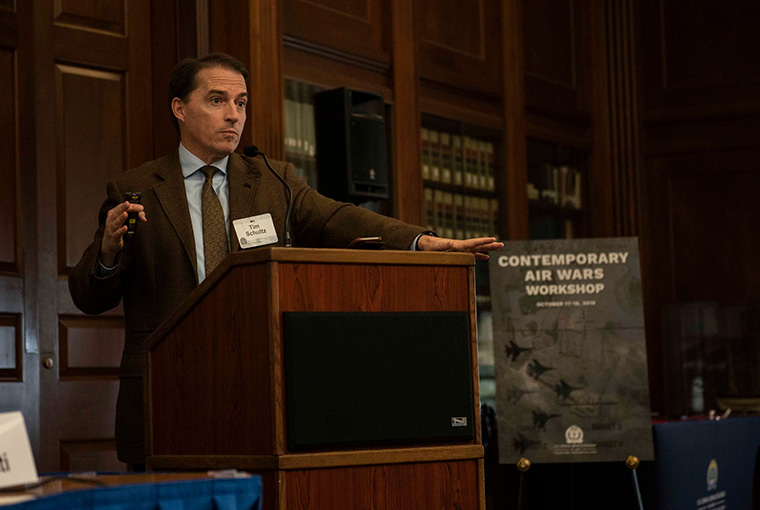U.S. Naval War College Holds Workshop Looking at Contemporary Air Wars

A U.S. Naval War College workshop on Oct. 17 took a deep look at the role of air power in contemporary wars, weighing success or failure in military and foreign policy terms.
The event comes at the midway point of a book project with Cambridge University Press that will compile analysis of air campaigns waged by the United States and other world powers since the end of the Cold War. Many of the workshop participants will be contributing chapters to the volume.
Phil Haun, Naval War College dean of academics, said he launched the effort to answer what he saw as a need for thorough, academic discussion of modern air wars.
“There was not a lot of good material available for professional military education-type courses that dealt with the air wars that we have been fighting for the past 25 years,” said Haun, a retired U.S. Air Force A-10 pilot and former A-10 squadron commander, who coordinated the workshop.
“I thought this would be a good opportunity to mix together international relations scholars and historians to take a look at these cases,” he said. “I don’t expect us to agree on every case. But what I have found teaching here at the Naval War College is that there’s great value in bringing together experts in different fields.”
Three Naval War College faculty members who are contributing to the book presented at the workshop.
In addition to Haun, the others were Colin Jackson, chair of the college’s Strategic and Operational Research Department, and Tim Schultz, associate dean of academics and a retired U.S. Air Force U-2 pilot.
The workshop, sponsored by the college's Center on Irregular Warfare and Armed Groups, also included presentations by scholars from Georgetown University, the Massachusetts Institute of Technology, the University of Cincinnati and Israel’s University of Haifa, in addition to military institutions.
Schultz discussed the idea that remote warfare – specifically the growing use of remotely piloted aircraft – has created a new “architecture” of air power, as the United States seeks to avoid putting Americans in harm’s way.
Schultz described the exponential expansion of U.S. unmanned aircraft use, with combat hours jumping from 250,000 in 2007 to 4 million in 2019. Unmanned Predator and Reaper vehicles were considered a primary tool of the Obama administration for counterterrorism actions in Afghanistan, the Middle East and Africa, he noted.
“In operating in these different environments, being able to perform different types of kinetic and non-kinetic missions, they become in a sense vehicles to satisfy political imperatives,” he told the group. “This new remote warfare gives (leaders) the capability to demonstrably do something.”
In discussions about air power in recent conflicts such as Libya and Iraq, scholars noted – with some frustration – that air campaigns produced military victories that didn’t result in lasting foreign policy success.
In a presentation on the 2011 NATO air campaign during the Libyan civil war, Maj. Jahara Matisek described the results as mixed.
“Was the international community successful? Yes, it was,” said Matisek, a U.S. Air Force pilot currently serving as assistant professor at the U.S. Air Force Academy and a non-resident fellow at West Point’s Modern War Institute.
"Can air power actually force nation and state building? I think all of these cases that we have here, for the most part, have shown that, no, air power cannot compel or change the politics on the ground, especially after the fact,” Matisek said.
Haun said the scholars are continuing their work, and the book could be released by 2021.
